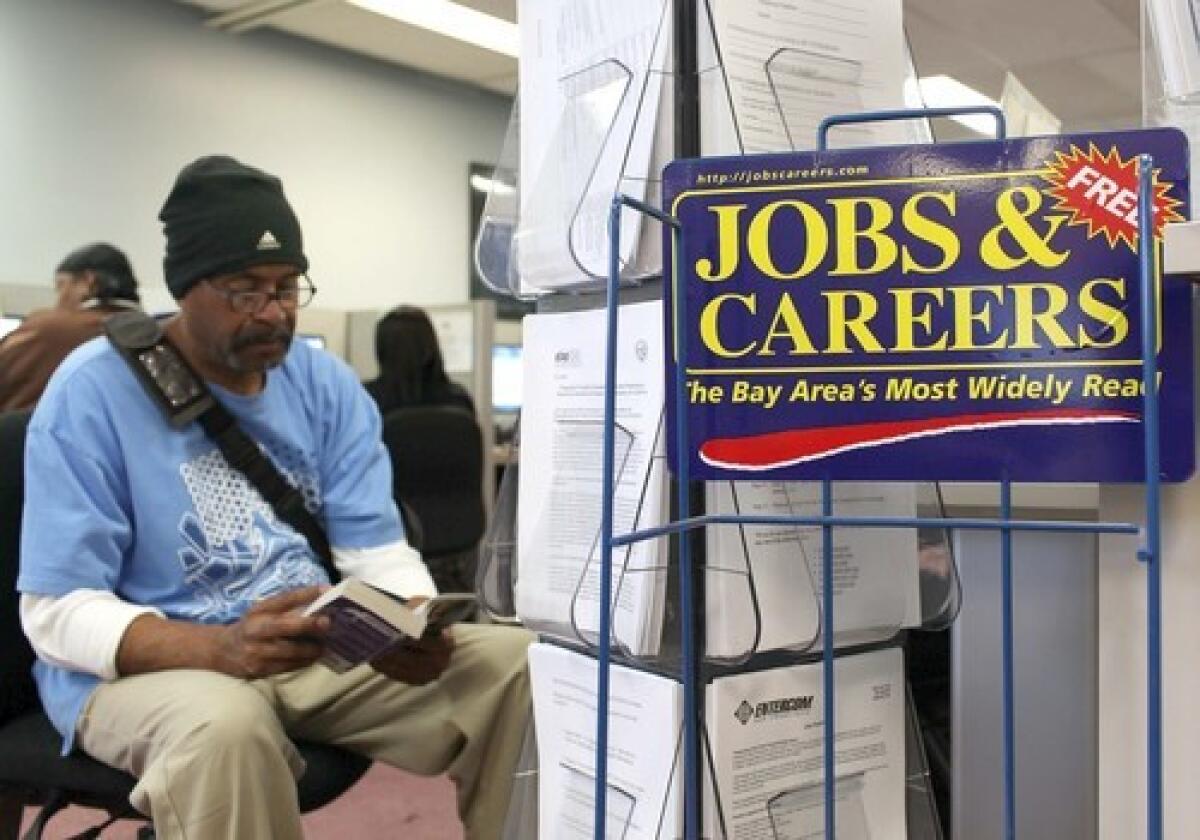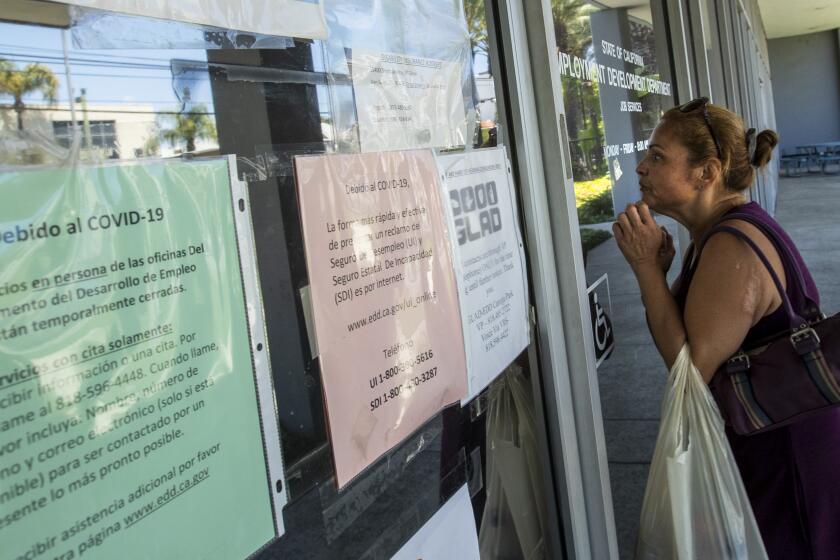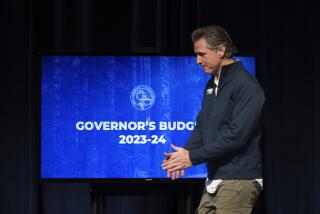California is asking Trump administration for new $300-a-week jobless benefit

- Share via
SACRAMENTO — California is asking the federal government for a $300 weekly supplemental unemployment benefit for jobless Californians, Gov. Gavin Newsom said Wednesday. The move comes after the Trump administration said states would not have to put up billions of new matching dollars, which the governor said last week made the plan unworkable.
With an initial $600 weekly supplement having expired last month — part of the coronavirus relief package approved by Congress in the spring — Newsom said his administration is in talks with federal officials regarding an application to provide a $300 weekly supplement after seven other states had their requests approved.
“We are still waiting for a little bit more clarity and guidance, but we are doing everything in terms of our application process to meet their needs, and our hope and expectation is to be among the first cohort of states to draw down that federal money,” Newsom said during a press conference.
Facing continuing unemployment related to the COVID-19 pandemic, President Trump signed an executive order on Aug. 8 to provide $400 a week to unemployed Americans as long as states pick up a quarter of the cost — $100. But Newsom said last week that it would cost California $700 million per week to cover the state’s $100 match, a cost he said the state cannot afford.
Since then, federal officials have said states could apply for the $300 supplement and count $100 in existing benefits paid to jobless people toward the state’s contribution, rather than providing an additional $100. So far, applications to the Federal Emergency Management Agency have been approved for states including Iowa, Arizona, New Mexico, Louisiana, Utah, Colorado and Missouri, according to U.S. Secretary of Labor Eugene Scalia.
“The Department is working closely with our partners at FEMA to ensure States have the resources they need to continue supporting Americans temporarily out of work,” Scalia said in a statement this week. “I’m encouraged that these States moved quickly to implement benefits, and we are working with more States to help them provide continued benefits to Americans in need.”
California has had to reinstate orders to close many businesses as COVID-19 cases spiked in the last month.
As a result, the state Employment Development Department has processed 10.2 million claims for unemployment benefits since the pandemic began in March — half of the regular claims filed in the last two weeks are applications to reopen claims from people who had previously stopped certifying that they were unemployed.
Newsom has said he hopes Congress will overcome a stalemate and restore the full $600 weekly supplemental benefit. But in the meantime, the governor said the state is open to whatever help it can get from Washington.
“We have been leaning into that. I am not walking away,” Newsom said Wednesday. “We, from day one, asserted an interest, and we have processed that interest in formal conversations and applications with our federal partners.”
States have until Sept. 10 to apply to FEMA for the supplemental benefits. Unemployed people are eligible if they have received at least $100 per week in unemployment benefits from the state. Newsom said Wednesday he could not yet provide a date for when the first payment might arrive on debit cards issued by EDD.
“We are going back and forth on those details” with federal officials, Newsom said. “As soon as we have clarity from the feds, we will be making public exactly when those dollars will be forthcoming.”
The governor said last week that reprogramming the state’s outdated computer systems to handle the new federal funding “would create time delays.” EDD Director Sharon Hilliard told state lawmakers recently that the agency could require up to 20 weeks to allow the state’s computer system to make payments.
EDD officials did not provide new estimates when asked Wednesday by The Times.
The new federal program is meant to provide supplemental help retroactive to Aug. 1, and ending Dec. 27, or when the program is terminated.
The average state unemployment benefit received by Californians is $305 per week, so even adding $300 means many jobless residents will still have “far too little” to make ends meet, said George A. Warner, an attorney with the group Legal Aid At Work in San Francisco.
The Newsom administration continues to face criticism from some jobless Californians and lawmakers over a backlog of more than 1 million claims that have not yet been approved.
As California grapples with a deluge of requests for unemployment benefits during the pandemic, government workers tasked with processing claims say they are hampered by outdated technology, bureaucratic red tape and a shortage of trained staff.
On Wednesday, Assemblyman David Chiu (D-San Francisco), a leading critic of the EDD, welcomed the news that the state will seek a $300 weekly supplement.
“Doing whatever we can to get Californians benefits during this emergency is crucial,” Chiu said. “Unfortunately, we know any changes to the program will create challenges for an already-overwhelmed EDD.”
Assemblyman Phil Ting (D-San Francisco) said he also worries that some people have questioned the legality of the president’s executive order, so he still hopes Congress will act.
“If nothing gets passed at the federal level, Gov. Newsom should consider calling us back under a special session so we can take matters into our own hands,” Ting said.
More to Read
Sign up for Essential California
The most important California stories and recommendations in your inbox every morning.
You may occasionally receive promotional content from the Los Angeles Times.












